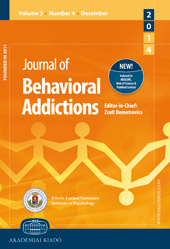Examining Personalized Feedback Interventions for Gambling Disorders: a Systematic Review
Examining Personalized Feedback Interventions for Gambling Disorders: a Systematic Review
Author(s): Loredana Marchica, Jeffrey DerevenskySubject(s): Individual Psychology, Social psychology and group interaction, Behaviorism, Substance abuse and addiction
Published by: Akadémiai Kiadó
Keywords: personalized feedback interventions; personalized normative feedback; gambling; intervention; prevention;
Summary/Abstract: Personalized feedback interventions (PFI) have shown success as a low-cost, scalable intervention for reducing problematic and excessive consumption of alcohol. Recently, researchers have begun to apply PFI as an intervention method for problematic gambling behaviors. A systematic review of the literature on PFI as an intervention/prevention method for gambling behaviors was performed. Methods: Studies were included if they met the following criteria: the design included both a PFI group and a comparison group, and the interventions focused on gambling prevention and/or reduction. Six relevant studies were found meeting all criteria. Results: Results revealed that PFI treatment groups showed decreases in a variety of gambling behaviors as compared to control groups, and perceived norms on gambling behaviors significantly decreased after interventions as compared to control groups. Conclusions: Overall, the research suggests that while PFI applied to gambling is still in its infancy, problematic gamblers appear to benefit from programs incorporating PFIs. Further, PFI may also be used as a promising source of preventative measures for individuals displaying at-risk gambling behaviors. While, evidence is still limited, and additional research needs to be conducted with PFI for gambling problems, the preliminary positive results along with the structure of PFI as a scalable and relatively inexpensive intervention method provides promising support for future studies.
Journal: Journal of Behavioral Addictions
- Issue Year: 5/2016
- Issue No: 1
- Page Range: 1-10
- Page Count: 10
- Language: English

